 Petzlover
Petzlover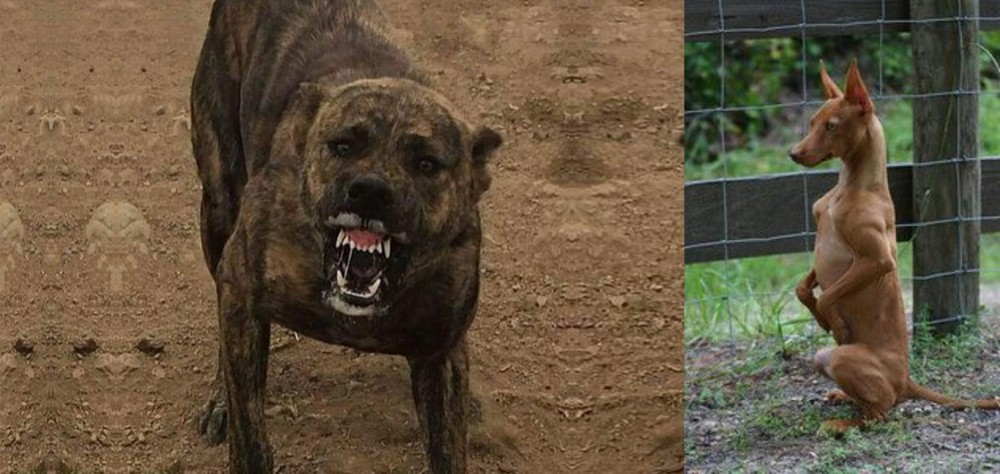 Dogo Sardesco is originated from Italy but Podenco Andaluz is originated from Spain. Dogo Sardesco may grow 15 cm / 6 inches higher than Podenco Andaluz. Dogo Sardesco may weigh 23 kg / 51 pounds more than Podenco Andaluz. Both Dogo Sardesco and Podenco Andaluz has same life span. Both Dogo Sardesco and Podenco Andaluz has same litter size. Both Dogo Sardesco and Podenco Andaluz requires Low Maintenance.
Dogo Sardesco is originated from Italy but Podenco Andaluz is originated from Spain. Dogo Sardesco may grow 15 cm / 6 inches higher than Podenco Andaluz. Dogo Sardesco may weigh 23 kg / 51 pounds more than Podenco Andaluz. Both Dogo Sardesco and Podenco Andaluz has same life span. Both Dogo Sardesco and Podenco Andaluz has same litter size. Both Dogo Sardesco and Podenco Andaluz requires Low Maintenance.
 This is an ancient working dog breed which hails from the Italian island of Sardinia. When you do research, you find that no one is sure as to this dogs exact origin, and there are a number of theories as to how the dog developed.
This is an ancient working dog breed which hails from the Italian island of Sardinia. When you do research, you find that no one is sure as to this dogs exact origin, and there are a number of theories as to how the dog developed.
Regardless of how the Dogo Sardesco came about, it is a valued companion of farmers in Sardinia, being appreciated for its protective nature.
The dog is a kind of Molosser or Mastiff dog. In the past the dog has been used as a working and hunting dog, and today he is a popular dog in mainland Italy. He is also known as Sardinian Mastiff, Sardinian Molosser and Dogo Sardo.
The Dogo Sardesco isn’t recognized today by international kennel clubs, and breeders on the island of Sardinia have done nothing to form a breed club for the dog.
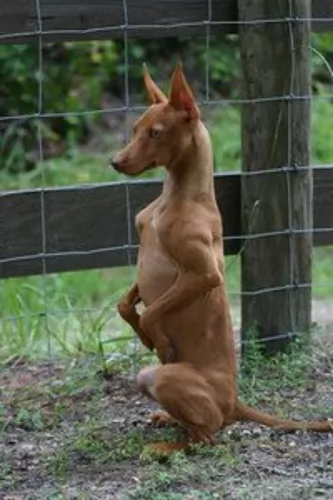 The Podenco Andaluz hails from the Andalusian region of southern Spain. It is believed that this dog is likely to have descended from the European hunting dog.
The Podenco Andaluz hails from the Andalusian region of southern Spain. It is believed that this dog is likely to have descended from the European hunting dog.
Because of the lack of distinctive characteristics, and also the similarities the dog shares with other dog breeds, the dog isn’t typically recognized in its own right. They have always been used as hunting dogs. The Andaluz is actually one of the lesser known Podencos and it isn’t recognized by the FCI.
 The dog Sardesco is a medium to large sized dog generally measuring 56 to 68 cm at the withers and weighing roughly 30 to 45 kg.
The dog Sardesco is a medium to large sized dog generally measuring 56 to 68 cm at the withers and weighing roughly 30 to 45 kg.
Because the dog isn’t bred to specific standards, it varies in appearance, but it is a powerful looking dog, being lean and athletic. The dog’s tail is traditionally docked, but with tail docking being frowned upon, the tail is left long and the dog loses its distinctive look.
The head of the dog is large and the ears are also traditionally cropped to be very short. Left naturally, the ears fold down closely to the sides of the head.The eyes are small and amber colored. The coat is short and smooth, but thick, and while it comes in many colors, the more regular color is red, brown, black, grey or brindle.
The Dogo Sardesco becomes a loyal family pet, more so when he has been trained and socialized. Although he is a devoted and affectionate dog, forming particularly strong bonds with his human family, he isn’t recommended for homes where there are young children.
He also doesn’t take too kindly to other pets in the home. This is because they are a strong-willed, dominant breed and might therefore not be a good choice for first-time dog owners.
Because Sardinian breeders have focused on developing an aggressive dog, he has become a dog suspicious of- and aloof with strangers. He is stubborn and self-willed, and to make him more obedient and amicable, he will require training and socialization. He is an alert, intelligent dog and this makes him an excellent watch dog.
The Sardinian Mastiff is an active dog too and won’t do well in a home where the people aren’t interested in exercise. He is the kind of dog that will need to be taken with you on walks, and he will love to spend time running alongside you when you go running or cycling.
He won’t adapt too well to life in the city, particularly when there is just a tiny garden.
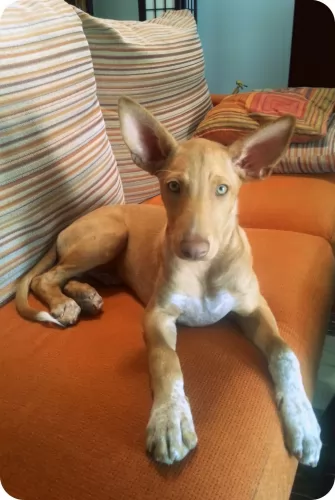 There are three different Andalusian Hounds - small, medium and large, but for the sake of space, we refer to the medium sized dog. The medium sized dog stands at between 42 and 53cm and weighs roughly 20 – 22kg.
There are three different Andalusian Hounds - small, medium and large, but for the sake of space, we refer to the medium sized dog. The medium sized dog stands at between 42 and 53cm and weighs roughly 20 – 22kg.
The dog has short hair, large erect ears and a long tail. Regarding color, most of these dogs are a reddish brown or plain brown color with some having patches of white.
The Andaluz is a dog which is reserved with strangers, but with their owners they are loyal and loving and never aggressive. The Andaluz is considered a one-man dog but he is more than capable of showing love and affection for all members of his human family.
This dog will benefit from training and socialization as this makes him more sure of himself and more obedient. He is an intelligent dog and won’t battle to learn simple commands. You’ll find your Podenco Andaluz to be sweet, calm and gentle indoors with training. He loves to lie close up to you,preferably on the couch right next to you!
 The Dogo Sardesco has always performed his role as a working dog well, and this is a reliable watch dog as well as the dog takes his job of guarding his human family seriously.
The Dogo Sardesco has always performed his role as a working dog well, and this is a reliable watch dog as well as the dog takes his job of guarding his human family seriously.
With his aggressive temperament, he has appeared on the list of banned breeds, and this is why he isn’t an ideal choice for homes where there are small children, as some small children haven’t been taught how to treat a dog with respect.
However, when properly trained and socialized he becomes an excellent companion dog. He has an intimidating look about him, but when he is with his human family, another side comes out and he is affectionate, loving and protective.
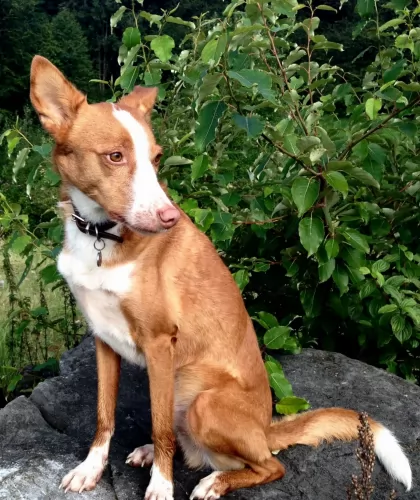 This dog has always been a hunting dog, and an excellent one at that. These days he is also a companion animal. It is very sad that these dogs have been given a cruel deal in Spain.
This dog has always been a hunting dog, and an excellent one at that. These days he is also a companion animal. It is very sad that these dogs have been given a cruel deal in Spain.
For those that make it into a loving home, they have proved to make excellent low maintenance dogs who are willing to provide their human family with faithful love and companionship that only a dog can provide.
 The Dogo Sardesco is a relatively healthy breed who is unlikely to suffer with ailments common to dogs, but nonetheless there are some diseases or conditions that you might want to be aware of with your dog.
The Dogo Sardesco is a relatively healthy breed who is unlikely to suffer with ailments common to dogs, but nonetheless there are some diseases or conditions that you might want to be aware of with your dog.
Skeletal and visual problems can occur in this breed. Both hip- and elbow dysplasia are common orthopedic disorders in dogs and they can cause a lot of pain and discomfort and even cause lifelong disability.
Genes and environmental factors play a part in your dog developing this disease.If he has been diagnosed as having hip or elbow dysplasia, get your dog to the vet as there are treatments which can at least make your pet a lot more comfortable.
Remember that feeding your puppy Dogo Sardesco too much food which is particularly high in calories can mean him growing too fast, and this can contribute to this hip dysplasia problem.
 Your Podenco Andaluz is a robust dog breed and doesn’t battle with any health conditions. However, having said that, every dog can battle with some of the more common dog illnesses, and then your dog may well have to visit the vet.
Your Podenco Andaluz is a robust dog breed and doesn’t battle with any health conditions. However, having said that, every dog can battle with some of the more common dog illnesses, and then your dog may well have to visit the vet.
Remember, that to give your dog the best chance, the dog should receive vaccinations to protect him from some life-threatening diseases.
This disease is brought about by the protozoan parasite Leishmania. The dog gets into trouble with this disease when sand-flies transmit parasites into the skin of the dog. The disease spreads to most organs, with kidney failure being the most common cause of death.
This is a fatal disease that is contracted through the bite of an infected mosquito. It is serious and will require veterinary intervention as its a disease that can create problems with the animal’s heart.
This is a fatal viral disease that can be passed on to your pet and affects the central nervous system. A dog with rabies is nearly always a dead dog, sadly. Symptoms include excess drooling, aggression and seizures.
 Dog owners who don’t like the idea of spending too much money on grooming will appreciate that the Dogo Sardesco is a very low maintenance breed, and that a good brushing twice a week will keep the dog’s coat shiny and healthy.
Dog owners who don’t like the idea of spending too much money on grooming will appreciate that the Dogo Sardesco is a very low maintenance breed, and that a good brushing twice a week will keep the dog’s coat shiny and healthy.
As with all other dogs, he will need to have his teeth brushed to remove plaque build up. Not only does plaque lead to dental disease, but bad teeth can lead to other health issues too.
Nail clipping will also be necessary if your pet doesn’t wear the nails down naturally from getting to run on a hard surface from time to time.
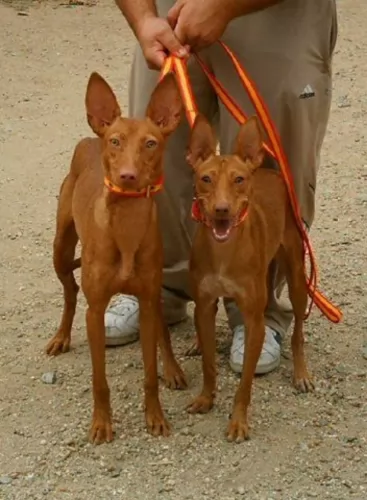 This has always been a hunting dog so he is used to running long distances. He is best suited to life in the countryside as opposed to life on a small property in the city. You will certainly need to take him on walks. If you are lucky enough to live near the beach, you can take bat and ball and hit the ball hard with the beach-bat, allowing your dog to race at top speed to fetch it.
This has always been a hunting dog so he is used to running long distances. He is best suited to life in the countryside as opposed to life on a small property in the city. You will certainly need to take him on walks. If you are lucky enough to live near the beach, you can take bat and ball and hit the ball hard with the beach-bat, allowing your dog to race at top speed to fetch it.
Regular brushing, at least twice a week will be required for the Podenco Andaluz. It’s a good idea to check your dog over for any odd lumps and for ticks and fleas. Keep his nails trimmed and check his ears and eyes for infection.
Every dog requires a good diet if good health and longevity are to be expected. Always check the labels of commercially manufactured dog foods to ensure that your dog gets a good dose of protein in.
The best quality foods have a good balance of vitamins and minerals in them, whereas some of the poorer quality foods have bad ingredients such as preservative, colorants and fillers.
Try and give your dog some wholesome home-made food such as boiled chicken, brown rice or pasta, sweet potatoes, spinach and carrots. Also, some raw meat occasionally will benefit your dog too, after all dogs have always been carnivores.